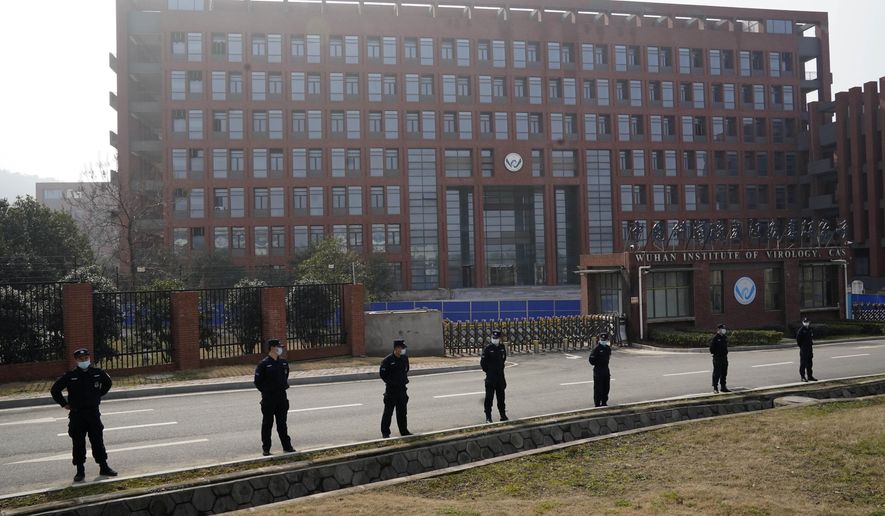The National Institutes of Health has quietly erased the Wuhan Institute of Virology — the facility at the center of speculation about the origin of COVID-19 — from its list of labs that can conduct animal testing with U.S. money.
Wuhan was on the list as of late April but has since disappeared. NIH has also erased all Russian laboratories from the list, meaning no taxpayer money from U.S. public health service agencies can be used for animal testing in that country.
In deleting the Wuhan Institute, NIH was striking back against the lab that some U.S. agencies have concluded spawned the COVID-19 pandemic, which upended the global economy and killed millions of people.
“China’s state-run Wuhan Institute of Virology, which was known to be unsafe, should never have received U.S. support for its dangerous experiments on bat coronaviruses,” said Sen. Joni Ernst, Iowa Republican.
She said she was “cautiously optimistic” about the delisting but disturbed that Wuhan got taxpayer money in the first place.
“What other batty studies are we paying for that are flying under the radar? I soon plan to introduce legislation requiring every penny sent to an institution in China or any other adversarial country be publicly disclosed,” she said.
Justin Goodman, senior vice president for advocacy at the White Coat Waste Project, which pushed to expose the U.S. money that funded Wuhan, called the delisting “a decisive victory in the War on Waste.”
He pointed out that as recently as last year, a senior NIH official pushed back against attempts to strip Wuhan and other foreign labs from performing risky gain-of-function research, which enhances dangers from pathogens.
The Wuhan lab survived several iterations of NIH’s approved animal testing list before it was ousted.
“Taxpayers shouldn’t be forced to fund a foreign lab run by an adversarial nation that wasted money, tortured animals, and engineered superviruses in dangerous gain-of-function experiments that violated the law and likely caused COVID-19,” Mr. Goodman told The Washington Times.
NIH acknowledged that Wuhan is no longer on the list but declined to say why.
“NIH does not discuss the review process for animal assurances requested for individual institutions,” the agency said in a statement to The Times.
It said certification is required only for labs that receive taxpayer money from U.S. public health agencies.
The NIH list of approved animal testing labs shows 1,115 domestic and 342 foreign facilities. The previous list had 1,119 domestic and 346 foreign labs.
That includes some new additions and deletions.
Among the deletions were three Russian labs: the Institute of Cytology and the Pavlov Institute of Physiology, both part of the Russian Academy of Sciences, and the Institute of Cytology and Genetics of the academy’s Siberian branch.
The Times reported last month that NIH had officially cut off all funding to labs in Russia to comply with President Biden’s executive order in the wake of Russia’s invasion of Ukraine.
One of those labs, the Pavlov Institute, had conducted research that involved debilitating cats and then making them walk on a treadmill to study spinal cord injuries and body motion.
The White Coat Waste Project said that research constituted animal torture.
NIH’s laboratory animal welfare office maintains the approved animal testing list. That office oversees animal testing conducted on behalf of public health service agencies, including NIH, the Food and Drug Administration and the Centers for Disease Control and Prevention.
A listing means a lab follows certain standards for the care of the animals it uses for testing.
The Wuhan Institute of Virology received roughly $600,000 in NIH money as a subgrantee to EcoHealth, a New York-based firm. NIH paid EcoHealth to conduct research on bat coronaviruses. Ms. Ernst and the White Coat Waste Project exposed the money in 2020, and Ms. Ernst pressed for an inspector general’s review in 2021.
That report, released earlier this year, found that NIH and EcoHealth were lax in monitoring Wuhan and other grant recipients and how they spent the money.
Wuhan’s research involved “enhanced growth” of the viruses, which should have triggered alerts to NIH. EcoHealth failed to raise the alarm properly, the inspector general concluded.
The audit did not tie the U.S. money specifically to the emergence of the coronavirus, nor did it comment on the theory that the virus leaked from the lab. It did say the government was aware of the risks but sent money anyway without imposing adequate controls.
The inspector general said Wuhan had stonewalled inquiries about its use of the money. The audit recommended that the lab be barred from receiving U.S. taxpayer money.
Under President Trump, NIH suspended the grant to EcoHealth. NIH restored the grant late last month, EcoHealth said, on condition that it submit itself to new oversight and that it not fund any research in China.
COVID-19’s origins center on two theories. One is the natural origin hypothesis, which posits that the virus jumped from an animal host to humans. The other is that it leaked from the Wuhan lab.
Some scientists say genetic sampling strongly backs the animal theory, suggesting that the virus was present in animals at a market in Wuhan. Yet some key U.S. agencies, including the FBI, believe the virus came from the lab, probably from an accidental leak.
In addition to the institute, run by the Chinese Academy of Sciences, Wuhan University was delisted from NIH’s animal testing approval.
The approved list still has 27 other Chinese labs.
For more information, visit The Washington Times COVID-19 resource page.
• Stephen Dinan can be reached at sdinan@washingtontimes.com.




Please read our comment policy before commenting.